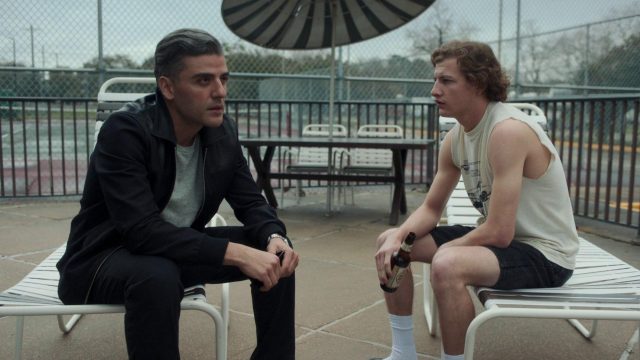There’s a grim, melancholy beauty to Paul Schrader’s The Card Counter, a film which deals with the aftermath of some of the ugliest acts imaginable. Sometimes that beauty is physical, shot with a rich luster: a matter of dark, gleaming wood; a nighttime botanical garden aglow like some kind of immense, breath-taking LiteBrite; attractive actors with smoldering chemistry. But it’s also the sublimity of a system, the beauty and terror of meticulous order that you can almost admire until it turns monstrous or reveals that the monster was there all along. You can count the cards and determine the odds and feel safe for a long time, if you don’t risk too much–but the house is always there.
Oscar Isaac’s William Tell–formerly PFC William Tillich–knows that. After years in prison, he lives a life stripped down to some curious essentials; he travels around the country, going from casino to casino and convention to convention, counting cards and winning the kind of sums the casinos can stand to part with. He doesn’t want a reputation. He doesn’t want anyone to know him. But when he sees a talk being given by Major John Gordo (played by Chekhov’s Willem Dafoe), he finds himself drawn in. He’s just going to sit there in the dark, after all.
But Tell does get recognized–though not by Gordo. (Stand under the spotlight and look out at the masses, and they’re all faceless.) He’s approached by Cirk (Tye Sheridan), the son of a man he once served with, a fellow protégé, if you want to call it that, of Major Gordo. Cirk blames Gordo for ruining his father’s life, turning him into a criminal, an addict, and an abuser, and he wants Tell to help him get revenge. Tell takes Cirk under his wing instead, opening up his life just a little in the hopes of giving Cirk another path. To drum up some money to pay Cirk’s debts, Tell joins the gambling stable managed by the smooth, professional La Linda (Tiffany Haddish). La Linda is drawn to Tell, but she knows enough to immediately see he’s done time. She knows he has a dark secret.
In a lot of movies, the handsome, emotionally wounded protagonist who is trying to do right by his old buddy’s kid would have a dark secret like a drunken hit-and-run: awful, but accidental, a one-time incident. Tell has more than that, and the film doesn’t shy away from exactly how horrific his past is. Schrader, who’s always good at tormented souls and mental distress, has cinematographer Alexander Dynan film these flashbacks through a fisheye lens. They’re first-person, as American Cinematographer points out, putting you in Tell’s shoes as he passes through hellish nightmares, bears witness, and participates:
The distortion that comes with a 220-degree angle of view flattened into a 2:1 frame — as opposed to the rest of the feature’s 1.66:1 ratio — combined with Fenton’s claustrophobic set design, results in an eye-straining, disorienting image. “Everything we did there was designed to make you sick,” says Dynan.
There’s no beauty there, just nausea, evil, pain, and complicity. But as disorienting as Tell’s memories of the time are, the same system is still there, undergirding it all, and it’s even more dishonest and ruthless than the casino. At least in the casino, there’s a firm line between the croupiers and the players. During his service, Tell managed to be both. And of course the house–represented by independent contractor John Gordo, with his smile and cool-eyed bonhomie–knew it would win.
The darkness in The Card Counter would be almost unbearable if Schrader didn’t find another, more elemental sense of structure beneath the mostly unchecked capitalism and imperialism. Schrader is pessimistic about the world but not, entirely, about the human condition; he can believe in and convincingly portray tragedy, redemption, and love, even if they sometimes find incomplete or compromised forms. He adds something ennobling to it all–and in a story that portrays dehumanization both large and small, unconscious and targeted, Schrader’s willingness to give his characters this kind of dignity stands out. It’s the third and most impressive kind of beauty in this dark, wrenching film.


